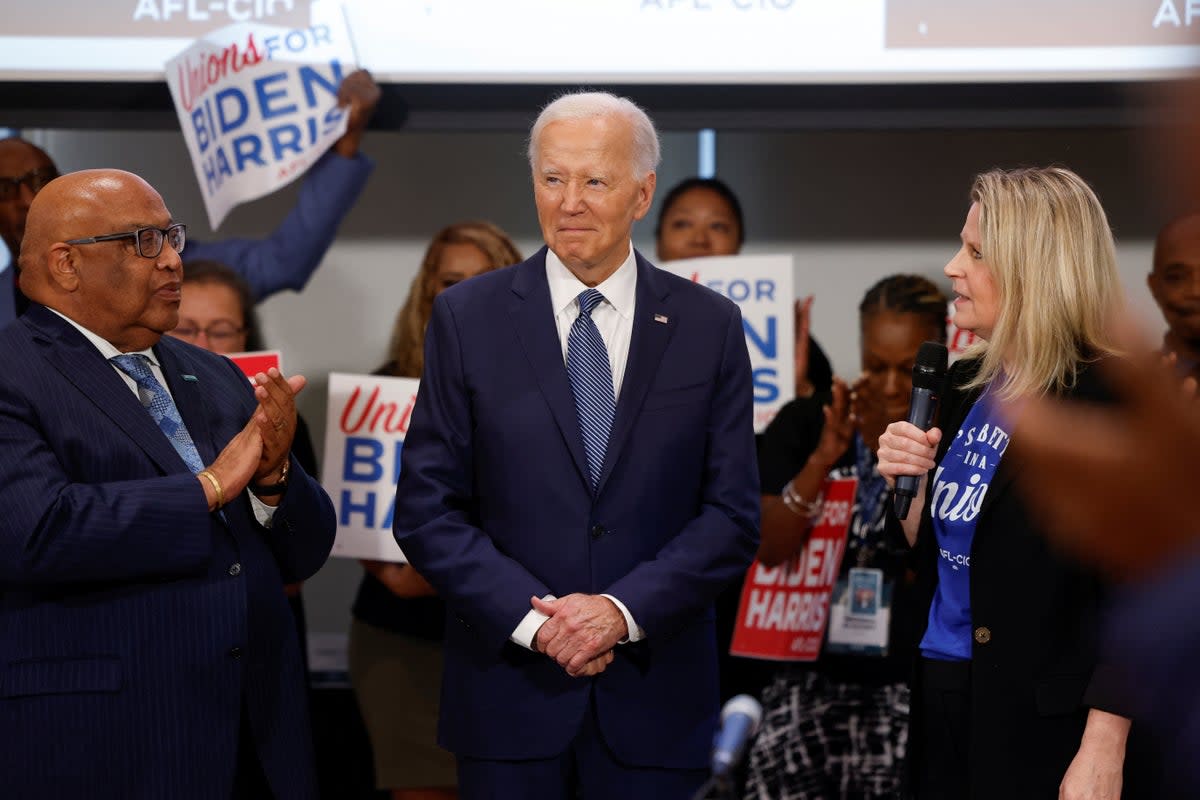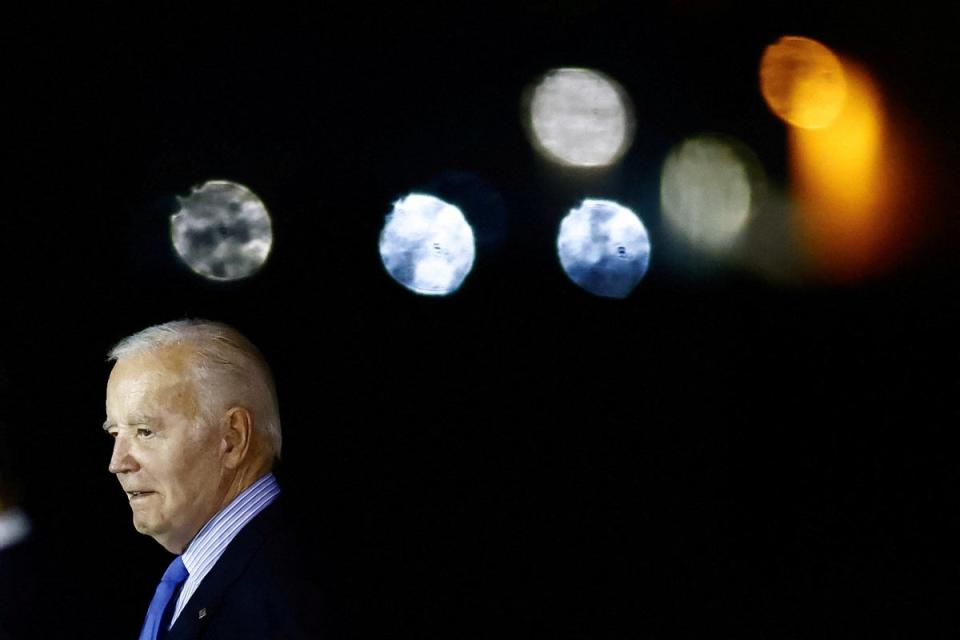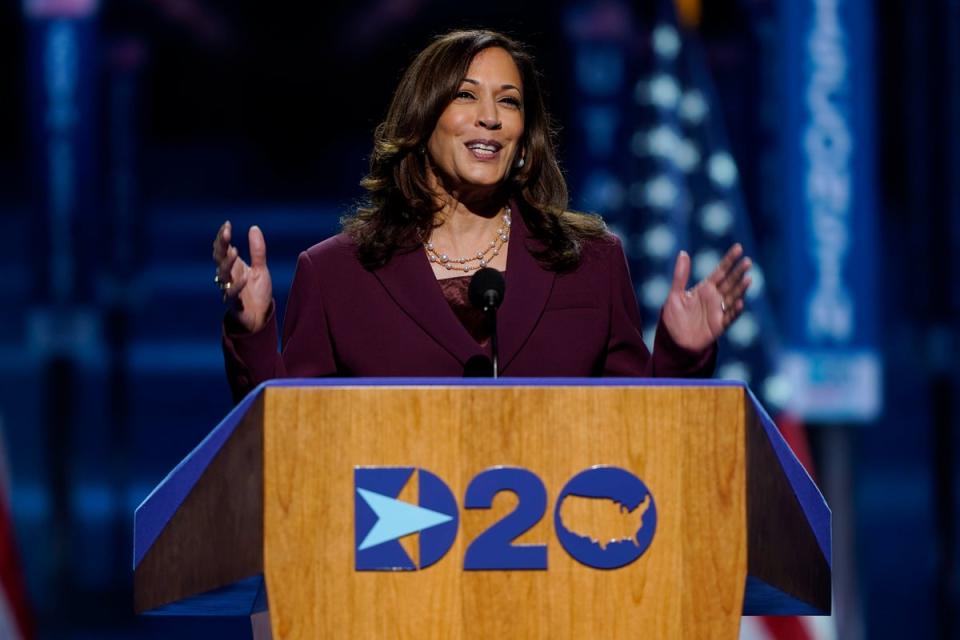The bogus right-wing legal battle to keep Joe Biden on the ballot

A powerful right-wing think tank is threatening a legal battle to make sure that Joe Biden is the Democratic Party’s presidential nominee in 2024.
But it’s unlikely that any lawsuit would be successful, election law experts say, pointing to state laws that allow the candidate who is nominated at a party’s convention to be the name on the ticket.
If the president ultimately decides to hang up his re-election campaign before the Democratic National Convention, where party members would then come up with an alternate nominee, there aren’t any legal pathways to force states to keep his name on the ballot.
The point of waging a potential legal blitz is more about making Democrats scramble in court rather than keeping Biden on the ballot, experts and voting rights groups told The Independent.
While the threats won’t be credible in court, they could be used to plant seeds of doubt to challenge the legitimacy of a new campaign and the results of the election, fitting into a pattern of other Republican-led lawsuits targeting election rules across the US.
The Heritage Foundation — architects of the Project 2025 plan for Donald Trump’s presidency — hopes to at least “make the process difficult” if Democrats switch up the nominee, according to a memo from the group.
Polls also show Biden losing to Trump at this point in their campaigns, and Trump’s allies are hopeful that the president staying in the race will end up giving Trump the best shot at winning.
The Heritage Foundation and Trump campaign did not return The Independent’s request for comment.
A memo drawn up by Heritage’s Oversight Project specifically mentions election rules for candidates in Georgia, Nevada and Wisconsin — battleground states that Biden won in 2020 — that the group believes are ripe for litigation.
But none of those states have any laws on the books that would prevent the Democratic Party from submitting a different nominee, if Biden were to drop out before or during the convention, according to secretaries of state and elections offices that shared candidacy requirements with The Independent. Biden is not formally the nominee until that moment.
“In reality, there would be no legal problem in any state,” writes election law expert Richard Winger. “No state requires a qualified party to certify its nominees for national office earlier than August 21.”
“I don’t put any credence into it,” adds University of California, Los Angeles law professor Rick Hasen. “Joe Biden is not the party’s nominee now, and states generally point to the major party’s nominee as the one whose name is on the ballot.”
Only if Biden dropped out of the race after the convention would have things been more “dicey,” he tells The Independent.
Even if those lawsuits go nowhere, Heritage hopes to have made things “extraordinarily difficult” for Democrats in the middle of an already-chaotic election, according to the group.
“The process for substitution and withdrawal presents many election integrity issues,” according to the Oversight Project memo. “Adherence to the law in some states may result in that process being unsuccessful for the purposes of another candidate being on the ballot.”
But in Nevada, for example, each political party must provide the names of their respective candidates for president and vice president to the secretary of state’s office no later than 5 p.m. on the first business day of September; this year, that date is Tuesday, Sept. 3.
That’s still more than a week after the Democratic convention ends.

Even if states required the Democratic Party to certify its nominee before convention, it would likely be unconstitutional under Supreme Court precedent — including in a ruling that involved Trump’s own eligibility for office.
Earlier this year, the justices heard arguments on whether the former president should be disqualified from appearing on Colorado ballots under the 14th Amendment, which bans candidates who participated in insurrection from holding public office.
There cannot be an unconstitutional “patchwork” system of ballots in which a candidate for president is on ballots in some states and excluded from others, according to the Supreme Court’s ruling in that case.
This is generally how nominees get on the ballot: States receive certificates from party conventions listing the nominees for president and vice president, and party chairs from each state list their party’s candidates for presidential electors. None of that paperwork gets to state election officials until after party conventions.
The Oversight Project notes that “at least 31 states defer to state or national party rules and committees for nominating in the event of withdrawal,” and that any legal challenges against those states “on improper delegation grounds” would be “marginally beneficial.”

But “confusion” in other states “may be its own source of litigation,” according to the memo.
The group claims that Wisconsin “prohibits withdrawal except in the case of death.” A lawsuit against that state “would likely bear some fruit,” according to the memo.
But that’s not how the state’s election rules are drawn up.
After the convention, the state or national chairperson for the Democratic Party will submit the nominees for president and vice president to the state’s election commission no later than 5 p.m. on Sept. 3. Those are the names that will appear on Wisconsin ballots.
Beyond that, deadlines are a matter of meeting printing schedules so that overseas voters or voters who requested absentee ballots can get them in time to fill them out and send them back before Election Day.
President Biden has repeatedly argued in interviews and in rally speeches that voters have already made their decision about who should be at the top of the ticket after selecting him in primary races across the country, and that party “elites” are the ones trying to “push” him to hang up his campaign.
Calls for Biden to drop out of the race are ignoring the will of the voters “who voted for me in primaries all across the nation,” he told rally goers in deep-blue Madison, Wisconsin, this month.
Still, time is tight. The convention in Chicago begins on August 19.
